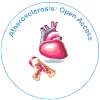A Cutting-Edge Medical Diagnosis Aid for Identifying Patients who Would Develop Atherosclerotic Diseases
Received Date: Jul 01, 2022 / Accepted Date: Jul 25, 2022 / Published Date: Jul 30, 2022
Abstract
The diagnosis of atherosclerosis is a difficult cognitive procedure. In medical diagnosis support systems, artificial intelligence techniques like machine learning algorithms have demonstrated their effectiveness (MDSS). In this study, we created a brand-new machine learning MDSS to improve cardiovascular disease diagnosis. 835 patient medical records with atherosclerosis, which is typically brought on by coronary artery disorders (CAD), were used in our study. These records were gathered from three databases. Several input variables based on three databases, including the Cleveland heart, are included in the system input layer. databases on illness, Hungarian, and Z-Alizadeh Sani. Artificial Neural Network (ANN), K-Nearest Neighbor (KNN), Support Vector Machine (SVM), Decision Tree (DT), Nave Bayes (NB), Classification Ensemble (CE), and Discriminant Analysis (DA) algorithms are used to evaluate the system. Through a number of performance indicators, the robustness of the suggested methodologies was assessed. The findings demonstrated that the suggested MDSS achieved an accuracy of (98%), which is greater accuracy than the current techniques. These findings mark a positive development in the field of widespread clinical atherosclerosis disease diagnosis. This section includes a review of the literature on a few chosen works on automated heart disease detection that made use of the same existing datasets and that we will later take into consideration for the performance comparison.
In the authors used a neural network ensemble approach to combine the projected values from earlier models to construct new models. 89.01% more accuracy was attained than with the machine learning approach. The authors suggested a clinical decision support system (CDSS) employing weighted fuzzy rules (WFR) for cardiac disease prediction in another paper that was published. Two evaluation scenarios were employed; the first automates the method for producing WFRs, and the second creates a fuzzy rule-based CDSS. Using the Cleveland Heart Disease database, they evaluated their CDSS. The best accuracy score this method achieves in comparison to a neural networkbased system is 62.35%.
Citation: Terrada O (2022) A Cutting-Edge Medical Diagnosis Aid for Identifying Patients who Would Develop Atherosclerotic Diseases. Atheroscler Open Access 7: 178. Doi: 10.4172/asoa.1000178
Copyright: © 2022 Terrada O. This is an open-access article distributed under the terms of the Creative Commons Attribution License, which permits unrestricted use, distribution, and reproduction in any medium, provided the original author and source are credited.
Share This Article
Open Access Journals
Article Tools
Article Usage
- Total views: 1346
- [From(publication date): 0-2022 - Mar 31, 2025]
- Breakdown by view type
- HTML page views: 1036
- PDF downloads: 310
